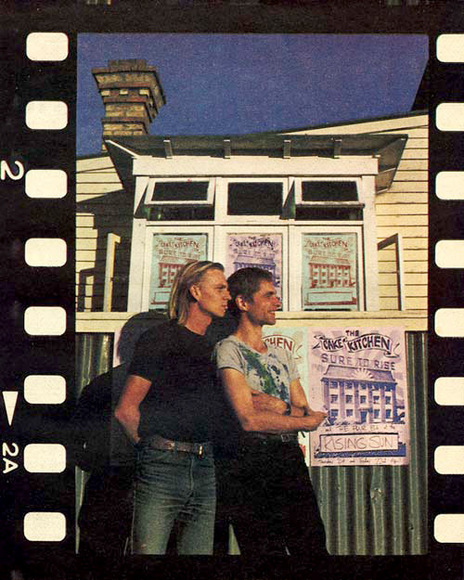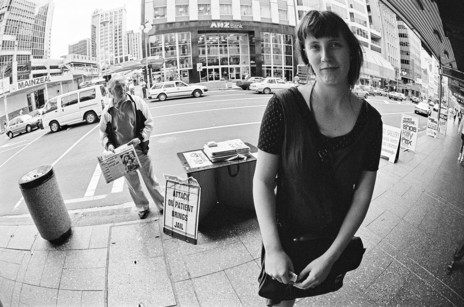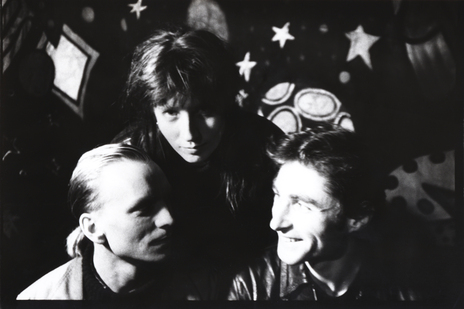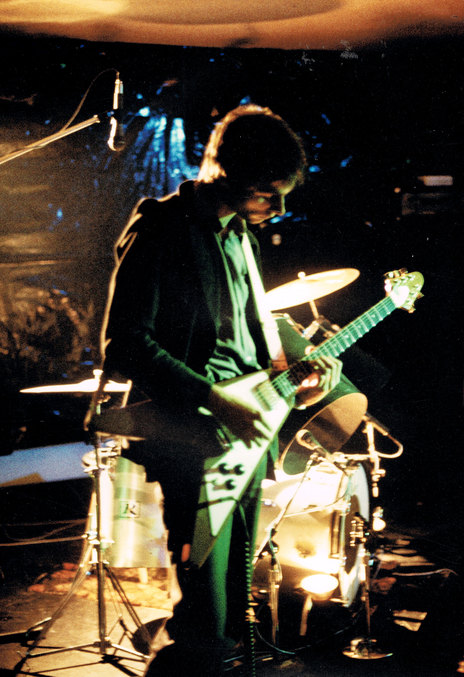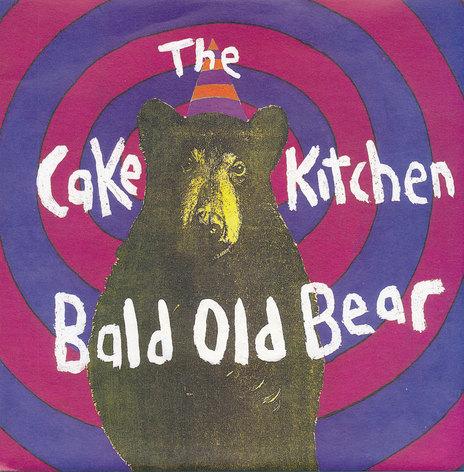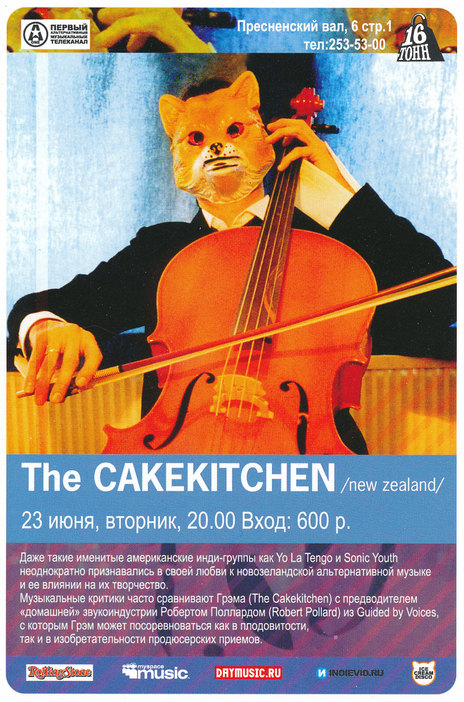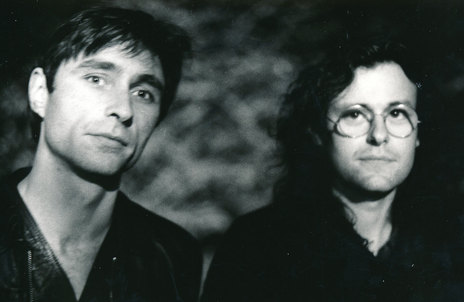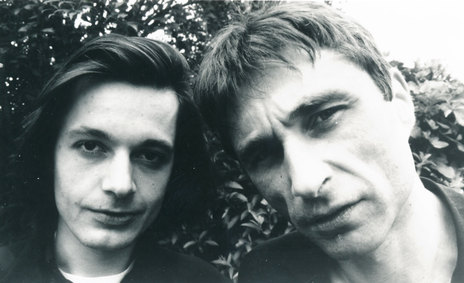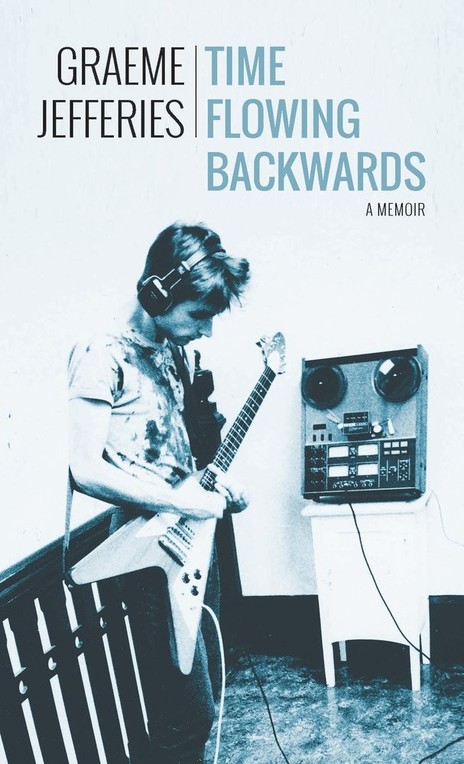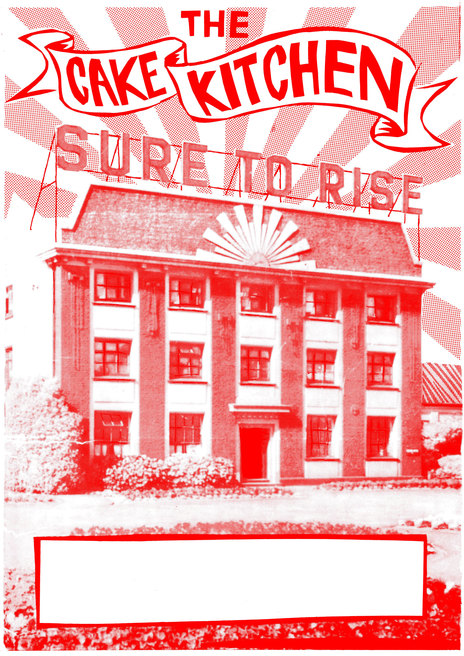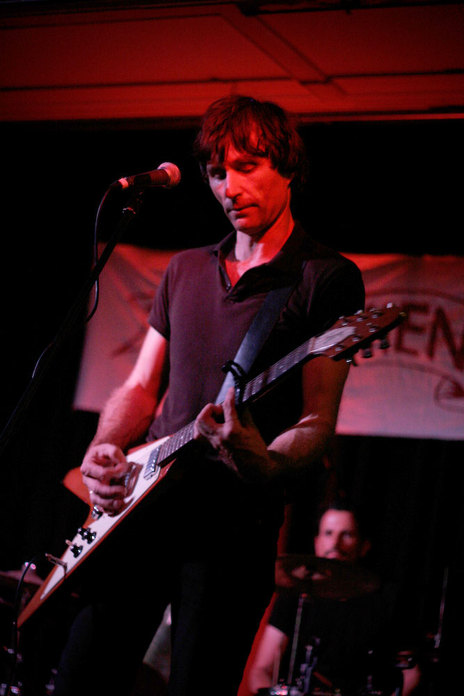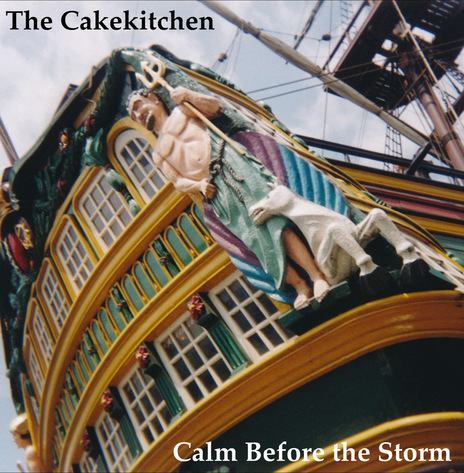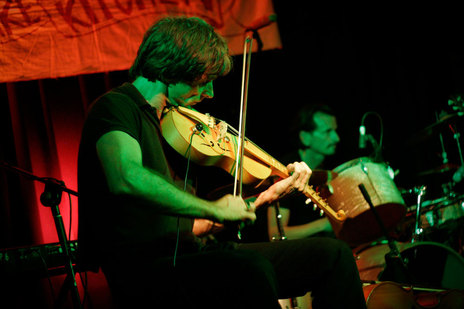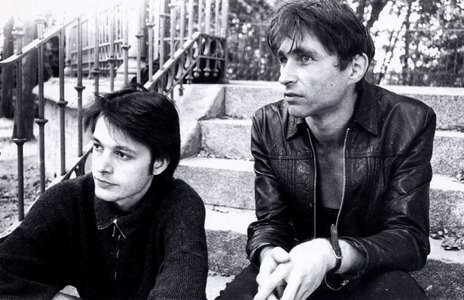London proved inhospitable and unpalatable at first for the wandering Jefferies, who made his living money busking in the London underground in the summer months after an abortive stint working in bars.
Undaunted, the guitarist soon gathered together the first offshore line-up of The Cakekitchen with Huw Dainow drumming and Keith McLean on bass – both New Zealanders. With Jefferies’ busking money buying recording tape, the fresh trio captured a new album, Far From The Sun, in the English capital and played The Cakekitchen’s first non-New Zealand shows. Then a fateful letter arrived from Ken Katkin at Homestead Records. “How could we not put out this album?” he told Jefferies, and a new door opened.
As The Cakekitchen he rode the highs of the 1990s international indie boom in Australasia, Europe and America and accumulated a sizeable recorded catalogue.
The seasoned post-punk composer and guitarist from the small Taranaki town of Stratford would persevere over the coming decades. As The Cakekitchen he rode the highs of the 1990s international indie boom in Australasia, Europe and America and accumulated a sizeable recorded catalogue. Live concerts in England, Europe and the United States with an ever-changing cast of new Cakekitchen members studded those restless productive years before his return to New Zealand in 2007.
Prisoner of A Single Passion
The first Cakekitchen with drummer Robert Key came together in 1988 in the rehearsal downtime of Flying Nun roadie band The Sombretones. Having already provided guitar for Jay Clarkson’s Breathing Cage, Graeme Jefferies was now doing the same for his flatmate Craig Mason’s group in Auckland. But Jefferies wasn’t born to be in someone else’s group. He had his own album to promote.
Released by Flying Nun Records in 1988, Messages For The Cakekitchen was a patchy affair but important in that all the seeds of the sounds Jefferies would pursue were contained within. He started the recording as early as November 1985 in Auckland, adding sessions in Dunedin in April 1986, before shifting to Christchurch’s Old Dominion Building (home to Flying Nun Records). The album was then mixed with older brother Peter Jefferies in Dunedin in February 1987.
One song in particular on the low key LP stood out. ‘Prisoner Of A Single Passion’ sung by Maxine Fleming, who also contributed keyboards, is a haunted ballad full of the sort of chilled grace found in such places as Nico’s Chelsea Girl. The aching melody and Jefferies’ deft insistent picked guitar and viola promised much for the future.
RipItUp heard it as a very personal record. “1985 and 1986 were pretty bad years (for me) and I think that’s reflected on the record,” Jefferies told them. “I’m a lot happier now – it’s like a learning process. I guess the album has put a lot of ghosts to rest. There is a positive side. ‘Simple Tapestry of Fate’ and ‘When The Moon Dies’ take those sorts of problems lyrically and tries to find a good way of dealing with them.”
Jefferies went on to praise the album’s 4-track recording process. “I really like the imperfections, you can hear people drawing breath … You can hear the songs are made by humans and while everything in the 1980s is getting more technical, I still like to be reminded that it is people in a room making music, and it’s a band, not a factory produced thing.”
With Messages For The Cakekitchen out, Jefferies lined up shows at Auckland’s Rising Sun with Chris Matthews in support. Over the following three weeks, Jefferies and Key found a way to do the album’s songs live then added some Graeme Jefferies acoustic pieces and a new one of their own. The duo’s musical dynamic was reliant on a “fairly full drum and guitar sound.” Even so, there were songs they couldn’t do, and Jefferies remained open to adding someone else to the line-up.
Two weeks later, The Cakekitchen were on before Straitjacket Fits. With half a dozen shows under their belt, the duo added Rachael King on bass.
To advertise the shows, The Cakekitchen whipped up a distinctive generic poster based on the image from the Edmonds Sure To Rise Cookery Book, a recipe book found in many New Zealand homes.
“I remember it sitting there and it was responsible for whole piles of things that my grandmother made that I couldn’t make myself. It’s a symbol of the sixties and seventies,” Jefferies said. “The one we used for the poster was from the third edition which was just at the start of the sixties. They’ve knocked the sign off the building (now). Imagine that, someone getting killed by a falling ‘Sure To Rise’.”
The red and white glossy poster would be seen on walls throughout New Zealand centres in the following two years as the duo, then the trio with Rachael King, connected with the country’s still robust indie community.
The new look Cakekitchen went on the road in July 1988 with The Sombretones (which included Key and Jefferies), taking in Nelson’s Turf Hotel, before heading to Canterbury University. In Dunedin it was The Wharf Hotel for two nights then inland to Wanaka and back up the island to Christchurch’s New Zealander for more two nights mid-month. August 5 found them back in Auckland with JPSE at The Gluepot, followed soon after by three nights at the Rising Sun.
Witness To Your Secrets
There was another national tour for The Cakekitchen in late 1988 before a promising eponymous EP arrived on Flying Nun Records in 1989. Recorded in December 1988 at Mascot Studios with Victor Grbic, two songs shine on that record – the oblique, hard-edged ‘Dave The Pimp’ credited to Key and Jefferies and the crystalline ‘Witness To Your Secrets’ – two distinct feels that would serve Jefferies well.
Earlier in the year, Graeme Jefferies’ collaboration with Alastair Galbraith on ‘Timebomb’ (b/w ‘Bravely, Bravely’) had finally appeared on the new Xpressway label. The storming ‘Airships’, another early recording, was a highpoint on both versions of Xpressway Pile-up, the label’s defining compilation.
Over three nights at The Empire Tavern they crammed their fans into the small third floor venue.
Dunedin audiences heard ‘Airships’ as The Cakekitchen’s set closer on the trio’s national tour in September. Over three nights at The Empire Tavern they crammed their fans into the small third floor venue. Previous shows saw them supporting Straitjacket Fits in Wellington at Tramways Tavern and playing to a small crowd in Christchurch. In their set were at least three of the songs – ‘Tomorrow Came Today’, ‘Ordeal By Water’, and ‘ McCarthy' – from World of Sand.
While they were in town, editor of The Captain’s Table fanzine Grant McDougall sat them down for an interview that appeared in Otago University’s student newspaper Critic. The new group dynamic came up in conversation. “Your limitations are only set by your imagination, really, there’s always a way to get around it. I found being in a two-piece limiting, but we all take a lot more responsibility. Robert and Rachael sing now. You are only limited by your imagination,” Graeme Jefferies told him. “With the drums I’m almost trying to be melodic as well as playing a rhythm,” Robert Key added.
The discussion moved on to songwriting and touched on some of the compositions’ internal dynamic, especially the dramatic stops and pauses.
“I find songwriting a really natural thing to do. It’s like second nature to me and I feel bad if I don’t do it. It’s just an easier way than talking to people in lots of ways, so it’s a pretty natural thing for me,” said Jefferies, who described himself as shy and “highly strung”.
A successful national tour took in provincial centres Hamilton and Palmerston North, concluding in Auckland at The Venue in the Station Hotel near the city’s historic railway terminal. The support group that evening was The Dead C.
All up, it was a busy year that took in the opening of The Venue in June and The Gluepot in November. They made the first issue of Stamp magazine in July and finally closed out 1989 at The Venue on New Year’s Eve.
The Cakekitchen were busy recording. In 1991, Homestead Records released Time Flowing Backwards, which paired The Cakekitchen’s first EP with stray tracks from the same period, including ‘Airships’ and ‘One Plus One Equals One’, which repeated the dynamic of the EP’s best tracks. Jefferies’ keening lead lines cut across all songs at will, riding Key’s responsive drums as the distant rumble of distorted guitar drew nearer and louder, before exploding into a beguiling storm of restless sound and Jefferies’ throaty spoken/sung words.
Graeme Jefferies had that sound and at least some of the songs that made up his first masterpiece, World Of Sand, as early as 1987, but by the time he got into Dunedin's Fish St studios with Alastair Galbraith, Craig Mason and Stephen Kilroy to record the album, it had been refined. He had an empathic and powerful drummer in Robert Key and gained an extra tier of melody from Rachael King.
As the days ticked down to Jefferies’ departure to England, The Cakekitchen stepped out with Drill to the Auckland Youth Theatre in February and The Gluepot in April.
Tomorrow Came Today
Signing to Homestead Records, a large-scale American indie label owned by record distributor Dutch East India Trading, enabled The Cakekitchen to survive and tour in the following years.
With the brilliant World Of Sand and the compilation Time Flowing Backwards to sell, the trio covered more than 5,000 miles in the United States in 1992 and 1993 on tours that took in CBGB and The Knitting Factory in New York (the first later issued as a live CD), Maxwell’s in New Jersey, the important New Music Seminar in New York, and Chicago, Boston, Minneapolis, St Louis, North Carolina, Washington D.C, Philadelphia, Boston and University of Pittsburgh with the group Pavement.
Far From The Sun, The Cakekitchen’s final LP on Homestead, appeared in 1993 in a distinctive cover by New Zealand artist Jane Davidson. The new record featured the standout song ‘Fahrenheit 451’. The three Homestead albums each sold around 5,000 copies in America. Meanwhile, Ajax Records picked up Messages For The Cakekitchen and TKP’s Beard Of Bees for re-release.
In the most comprehensive and revealing interview Graeme Jefferies has given so far, for the Frequency Squared blog in October 2005, he tells Jim Ebenhoh, an American living in New Zealand, about crashing into what looked like a Mafia car in New York en-route to dropping off David Kilgour at his brother Hamish’s house.
The Cakekitchen split again and Jefferies moved to France where the trio had previously toured.
With Keith McLean returning to New Zealand, The Cakekitchen split again and Jefferies moved to France where the trio had previously toured. There he met by chance a multi-instrumentalist, Jean-Yves Douet, who became the group’s new drummer.
A change in record companies wasn’t long in coming. American indie Merge Records joined new German imprint Raffmond Records (who had released World Of Sand in Europe) in releasing two strong albums. Stomping Thru The Boneyard arrived in 1994. The even more consistent Devil and The Deep Blue Sea (1996) housed two masterpieces of melodic razor-edged ebb and flow in ‘Old Grey Coast’ and ‘Bald Old Bear’ which was issued as a single by Raffmond. The Cakekitchen captured ‘Ballad Of Oxford Circus’ at New Jersey freeform radio station WMFU, a longtime supporter of New Zealand’s indie music.
Alastair Galbraith appears on both albums, one of the most frequent of the collaborators that Jefferies would draft in over the years on a list that included David Mitchell, Gary Sullivan, Denise Roughan, Jay Clarkson and Hamish Kilgour.
As had become typical of albums by The Cakekitchen, the songs were recorded over a number of years in a number of countries including France, England, New Zealand and the United States.
With Jean-Yves Douet drumming, The Cakekitchen toured New Zealand in September 1994. They set up camp in Taranaki and refined their set before playing Jefferies’ first show in New Plymouth since 1983. What fans saw on that national tour was two emphatic musicians playing a well honed set of songs, full of power, grace and melody. Many of the songs in that sparkling set appear on Devil and The Deep Blue Sea, recorded between July 1993 and December 1994, but not released until 1996. Then it was back to America and on to Europe. Graeme Jefferies, having briefly lived in Holland, was now resident in Germany.
Jean-Yves Douet departed after the Fast Forward Festival at Nijmegen in 1995. Jefferies stopped enjoying performing live and began to wind down The Cakekitchen after a tour with The Mountain Goats (who’d covered Jefferies’ ‘Mad Clarinet’) in early 1996. There was one more album in 1996 from the group, Everything’s Going To Work Out Just Fine, on English indie label Freek Records.
Having been down to the last of his money at times and slept rough or on friends’ couches, Jefferies understandably craved a little more security. He eventually settled in Recklinghausen in NordRheinwestfalen in Germany’s heavily industrialised west and began working with Raffmond’s Edmund Epple, distributing a catalogue of 100 records through Rough Trade Germany, who would soon employ Jefferies themselves.
How Can You Be So Blind?
Graeme Jefferies stayed in Germany for much of the 1990s and into the 2000s. He returned to New Zealand briefly in 1999 to visit his mother, but it wasn’t until 2002 that he began to perform and record again in earnest. Tempted onto a tour by Robert Scott, who was in Germany to promote his Creeping Unknown album, Graeme Jefferies enjoyed the low stress experience and caught up on years of New Zealand music news. Shortly afterwards, he began the long hard haul once again.
Jefferies hadn’t exactly been quiet in the down years. He released a limited run CD Talkin’ To Me In My Sleep in 1998 on Eggbox Records, his personal imprint. But it was 2003’s How Can You Be So Blind? that showed the indie music scene just what it had been missing.
No doubt aided by years of downtime, the new album was full of strong compositions and recordings.
No doubt aided by years of downtime, the new album was full of strong compositions and recordings. Charging out of the gates with ‘I Know I Really Like Your Style’, he chased that frenetic track with two sparkling ballads that remain amongst his best work, ‘Gold Neon Moon’ and ‘Beautiful Hidden Lagoon’. Pressed on vinyl by the new Hausmusik label run by his friends from Raffmond, the LP features longtime collaborator Markus Acher on drums, Barbara Streidel (double bass), Mathis Mayr (cello), percussionist Salewski and Osamu Nambu on violin. The German tour that followed found club bookers keen to re-engage with Jefferies, despite the wider music scene making less money and in an indecisive state of mind.
Back on the road as a full time musician and recording artist, Jefferies played where he could and released his albums through Eggbox or whomever else was willing. In 2005, he performed in Vienna before returning to New Zealand in October for solo shows in Auckland and Wellington. At Auckland’s Kings Arms, a well-attended concert audience heard 27 songs over two hours, including covers of Nocturnal Projections and This Kind of Punishment tracks, alongside The Clean’s ‘Getting Older’.
A chance encounter with former bass player Rachael King on a Wellington street put him back in contact with drummer Robert Key in Auckland and a jam ensued at Keith McLean’s house in Auckland’s far west. Two more albums, Put Your Foot Inside The Door and Live at CBGB, NYC, 17 June 1992 arrived through Eggbox.
Over the next eight years, Graeme Jefferies moved between Europe, New Zealand and Australia, finding an audience at Denmark’s Arhaus Pop Revo Festival and releasing Everything’s Driving You Crazy Cos You Just Can’t Get What You Want in 2006. The following year, Graeme Jefferies moved to Wellington and released Stories For Late At Night on US indie, Unfun, an album done mostly solo with strings.
In June and July 2009 he performed in Moscow and St Petersburg. While there, Jefferies produced an album for Dairy High, with whom The Cakekitchen shared a split single on Reds Under The Bed. Yet more German shows and a single New Zealand performance in 2011 were followed by a brief move to Sydney, where he teamed up with Nocturnal Projections bass player Brett Jones, who played drums. The old friends used Jones’ attic as a recording space to set up the portable studio that Jefferies had taken to shipping around the world on a palette. The resulting album, Kangaroos in My Top Paddock, was released in a 300 run on US indie Violet Times in April 2011.
As recently as February 2013, a new album, Calm Before The Storm was released on vinyl by Eggbox and Wellington’s Rough Peel Records.
Graeme Jefferies remains a fine songwriter and riveting performer, who no doubt is even now working on the next phase of what has been a 30-year plus creative odyssey.
“I like the privacy of it,” he told Frequency Squared in 2005. “I choose solitude quite often as an option. I think that’s why it’s been so easy for me to sustain such a long career of writing music or writing songs, in that it’s something I do by myself for kicks. Like the small town thing – nothing to do, didn’t want to go and steal cars or be a redneck at the pool hall – so I started playing an instrument, writing songs, making something out of nothing – the magic of making things out of air, and how when you write a song you’ve got no idea what time it is – maybe you finish at 3 o’clock in the morning, or perhaps when the sun comes up you don’t notice, you forget to eat; the only thing you remember to do is keep drinking coffee.”
In 2018, Graeme Jefferies published his memoir, Time Flowing Backwards, to wide critical acclaim.
